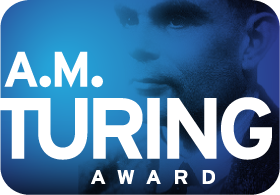
A.M. TURING AWARD WINNERS BY...
Michael Stonebraker

United States – 2014
Short Annotated Bibliography
- Michael Stonebraker, "Implementation of integrity constraints and views by query modification," SIGMOD 1975, p.65-78.
Describes query modification, a technique used by INGRES and later generations of database management systems to efficiently implement data integrity rules and virtual "views" combining data from several tables.
- Michael Stonebraker, Eugene Wong, Peter Kreps, Gerald Held, “The Design and Implementation of INGRES,” TODS 1(3), p189-222 (1976).
A classic paper, describing an early version of INGRES, explaining key design decisions, and documenting the approach taken to implementation.
- Michael Stonebraker, Greg Kemnitz, “The Postgres Next Generation Database Management System,” CACM 34(10), p78-92 (1991).
Describes Postgres, Stonebraker's influential followup to INGRES.
- Michael Stonebraker, Dorothy Moore, Object Relational DBMSs: The Next Great Wave (Morgan Kaufman, 1995).
The early 1990s saw a wave of enthusiasm for "object oriented" database management systems. Stonebraker argued that extending conventional relational database management systems with the ability to handle more complex data types, as he had done with Postgres, was a better solution than shifting to an entirely new model. Major commercial systems soon followed this approach.
- Michael Stonebraker et al, "C-Stone: A Column-Oriented DBMS," VLDB 31, p533-564 (2005).
During the later part of his career Stonebraker has championed the idea of optimizing database management systems for specific applications. This influential paper described a relational system optimized for rapid retrieval, rather than updating, and therefore suitable for data warehousing projects. The project was commercialized by Vertica, one the many companies co-founded by Stonebraker during the 2000s.




























 THE A.M. TURING AWARD
THE A.M. TURING AWARD